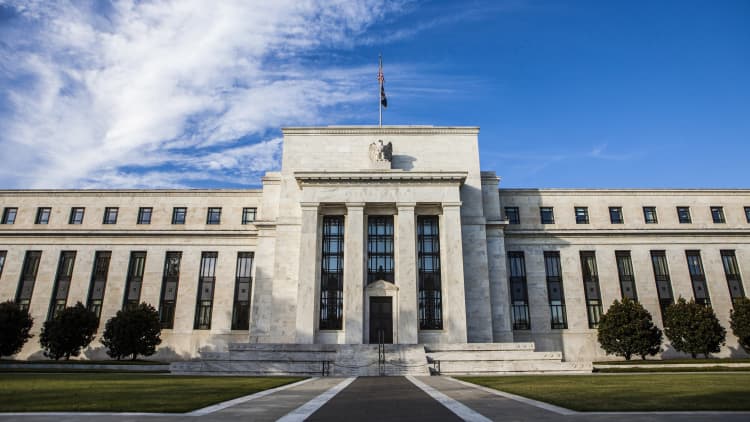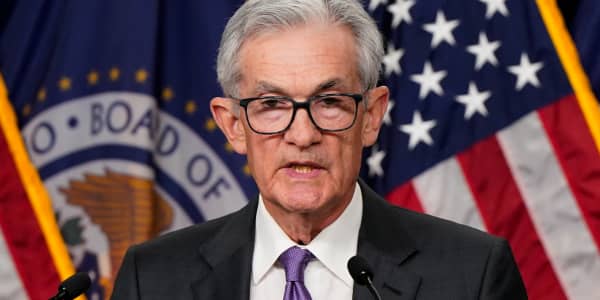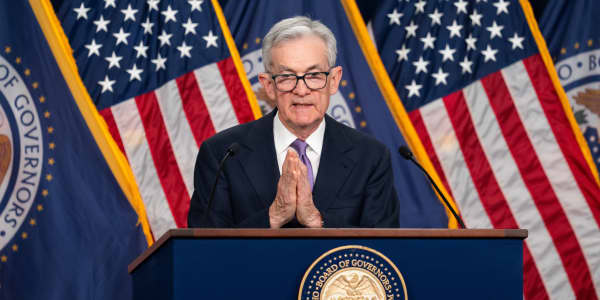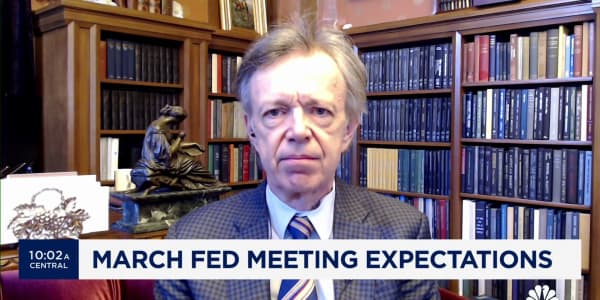
The CNBC Fed Survey for December finds its Wall Street respondents forecasting more aggressive Federal Reserve rate hikes and believing the market is too optimistic about the policies of President-elect Donald Trump.
"Expectations in the stock market are beginning to run ahead of reality," Marshall Acuff, managing director of Silvercrest Asset Management, wrote in response to the survey.
Fully 96 percent of respondents expect the Fed to hike rates on Wednesday, which will mark the first rate hike in a year and the second in a decade. A 44 percent plurality see the next hike coming in May, with February being the second choice. The survey, conducted Thursday and Friday, got responses from 46 people, including economists, fund managers and analysts.
Respondents ratcheted up their outlook for the Fed Funds rate in each of the next three years, with rates seen hitting 1.26 percent next year, 2.1 percent in 2018 and 2.7 percent in 2019. The terminal rate, or where the Fed is expected to stop hiking, rose to 2.9 percent from 2.4 percent in the previous survey, the sharpest hike recorded since the question was first asked in August 2014. But the Fed is not seen ending its rate hikes until the second quarter of 2019, one quarter later than forecast in the previous survey.
"One of the greatest risks is that the Fed may try to get ahead of expected fiscal policy changes and tighten too much too soon," wrote Mark Vitner, senior economist of Wells Fargo. "The chances of making a policy mistake go up whenever you start making major policy changes."
Respondents see much more modest stock gains over the next couple years than the market seems to be building in, with just a 4 percent gain predicted in the S&P 500 next year from the current level, and a 9 percent gain forecast for 2019. Yields on the 10-year Treasury are seen rising to 2.90 percent by the end of 2017, 65 basis points higher than in November, and to 3.44 percent for 2018, the first time the question has been asked for that year.
More than 80 percent say the market's recent gains are driven by expectations of policy changes from the new administration rather than economic fundamentals. And more than half of respondents say the market's expectations for those policy changes under Trump are too optimistic.
"A lot of assumptions are being made on the effect Trump has on the economy, but for my taste there is too much uncertainty, seeing as how he has not yet been sworn in," wrote Lou Brien, an analyst at DRW Trading Group.
Respondents gave Trump's economic policies generally positive marks, with 88 percent saying they will increase growth at least somewhat and 68 percent saying they will increase jobs. But 93 percent say those policies are likely to increase inflation and 94 percent say they will increase the deficit, with more than half of those saying they will increase deficits significantly.
"Starting in February, when Trump actually has to write down what his policies are, reality is likely to set in as they cannot be as good for growth as the markets currently think," said Joel Naroff of Naroff Economic Advisors.
On specific policies, cuts to business taxes and regulations got the highest marks, with somewhat less support from the group for individual tax cuts. Trump's trade policies received deeply negative grades.
Expectations in the stock market are beginning to run ahead of reality.Marshall Acuffmanaging director, Silvercrest Asset Management
Six in 10 respondents say Trump will not be able to impose the 35 percent tariff he has threatened on companies that send jobs overseas and 85 percent say it will hurt growth at least somewhat.
Trump's "opposition to the TPP, NAFTA and suggested tariffs on imports could drive up the price of goods retailers rely on,'' wrote Jack Kleinhenz, chief economist for the National Retail Federation, who praised Trump's tax reform and infrastructure plans.
Despite many believing that the market is too optimistic over the prospects for policy change, respondents still marked up their outlook for growth and marked down the prospects for recession. The probability of the U.S. entering recession fell to 18.1 percent, its lowest level since July 2015. GDP is now seen rising 2.6 percent in 2017, up from 2.2 percent and to 2.8 percent in 2018. Inflation is forecast to rise next year to 2.4 percent and 2.6 percent in 2018.
Scott Wren, senior global equity strategist of Wells Fargo Investment Institute, was among the more pessimistic on growth. "We stand by our long-held stance that the new president, and really any new president, has only a slim chance of changing the trajectory of the economy during their first 12 months in office (and likely even longer)," he wrote in response to the survey.
Protectionist trade policies are now seen as the biggest threat to the U.S. economic recovery, up 23 points from the November survey. Concern over tax and regulatory policy fell sharply as did worries over global economic weakness, which has dominated the top spot for many months.





